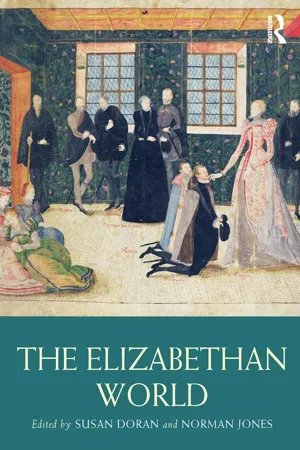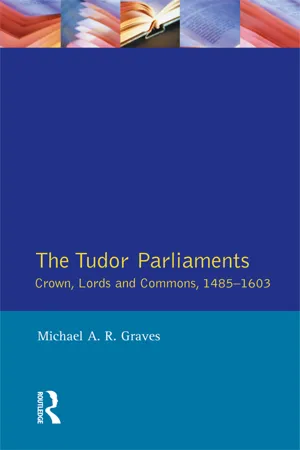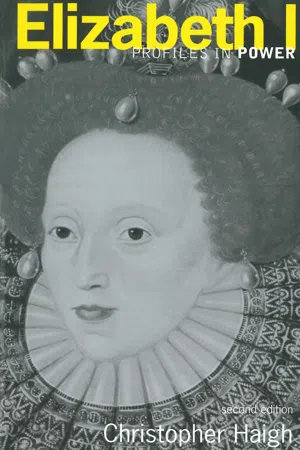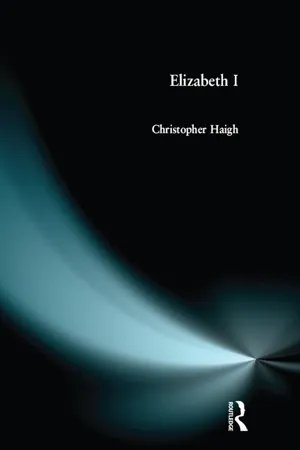History
Elizabeth's Parliaments
Elizabeth's Parliaments refer to the sessions of Parliament held during the reign of Queen Elizabeth I of England. These parliaments played a crucial role in shaping the political and religious landscape of the time, as well as in enacting laws and policies. Elizabeth's Parliaments were marked by significant debates and conflicts, particularly regarding the queen's authority and the establishment of the Church of England.
Written by Perlego with AI-assistance
Related key terms
5 Key excerpts on "Elizabeth's Parliaments"
- eBook - ePub
The Reign of Elizabeth I
1558–1603
- Stephen J. Lee(Author)
- 2020(Publication Date)
- Routledge(Publisher)
2 ELIZABETH AND PARLIAMENT BACKGROUND Altogether, Parliament met during twenty-six years of the reign of Elizabeth (1559, 1563–67, 1571, 1572–81, 1584–85, 1586–87, 1589, 1593, 1597–98 and 1601). It dealt with religious issues, especially the settlement of 1559, subsequent demands for modifying the settlement, financial needs for campaigns against Scotland and France, several rebellions, the attainder of Mary Queen of Scots, the increasing crisis involving Spain, and a variety of social issues, including the Poor Law. This was an extensive involvement, even if constitutionally less momentous than it had been during the reign of Henry VIII. Analysis 1 considers the extensive reinterpretations: here it would be no exaggeration to say that former arguments have been stood on their heads. Analysis 2 examines the main changes made to Parliament during the reign, while Analysis 3 deals with the relations between Parliament on the one hand and the Queen and her government on the other. ANALYSIS 1: HOW HAVE THE VIEWS OF HISTORIANS CHANGED ON ELIZABETH’S PARLIAMENTS? Views depend on the perspectives of a particular period: inevitably the ‘new view’ of one period will become the ‘old view’ of the next. Elizabethan Parliaments have seen three clearly identifiable phases of interpretation. The first of these lasted from the nineteenth century until the 1940s, with major reinterpretations following in the 1950s. These, in turn, were widely accepted until the 1980s when they were summarily inverted. The emphasis of nineteenth-century historians such as J. Lingard 1 was very much on the despotism of the Tudors, against which Parliament was relatively helpless (see Source 2.1 below). Parliament was considered to have played little part in the centralisation of government and administration under Henry VIII - eBook - ePub
- Susan Doran, Norman Jones(Authors)
- 2014(Publication Date)
- Routledge(Publisher)
Contemporaries recognised that there was political conflict in Parliament, with opposing sides facing off against each other, and these could be over subsidies, religion or more mundane matters, even Hooker’s ‘leather and wool’. Townshend, who kept a very detailed diary of the 1601 Parliament, noted that Devon’s MPs joined forces to oppose a Bill on fustian cloths, revealing that the Bill had its supporters and detractors. In 1593, when the Lords urged the Commons to increase their offer from two to three subsidies, Robert Beale protested and cited precedents that convinced Speaker Coke but not, an unknown diarist tells us, the Privy Councillors or the courtiers. On the next day of business Beale stood up and said that he had been mistaken, but Strode tells us that Beale was made to recant and implies that he was prohibited from attending Parliament thereafter. Two other MPs who spoke against the government line, Francis Bacon and Henry Unton, suffered royal disapproval once the Parliament was over, proof that what you said during a session could have profound effects on your political life thereafter, even if only in the short term.The political role of Parliament and the politics of law-making were shaped by particular events and circumstances. Because there were thirteen sessions over forty-four years, the political, religious, economic, social and cultural contexts of each meeting were different from the last and from the next. The Parliaments of the 1560s met in the first decade of a new reign, when most expected their queen to marry and settle the succession through the birth of a legitimate heir, and these hopes continued into the 1570s and 1580s. The restoration of Protestantism dominated the first parliament of the reign, and the limitations of that settlement led some who saw it as a beginning rather than an end as only the first step towards a truly godly Protestant Church, to seek further religious reforms in each Parliament until the end of the reign, but especially in those of the 1570s. With the outbreak of war in Spain, foreign policy matters were discussed in the parliaments of the second half of the reign to a greater degree than earlier, and the tensions caused by war preparations, such as the exercise of royal purveyance to supply the troops, were not simply matters of economics but of politics too. With the severe economic crisis in the middle years of the last decade of Elizabeth’s reign, Parliaments spent more time than before debating and drafting laws on enclosure, depopulation and poor relief.While the clerks only noted the titles of Bills and their proceedings, the survival of all of the Acts and many of the Bills which were promoted allows a rich picture of the sheer immensity and diversity of the law-making process to be recovered. Their preambles, which justify each measure, are worthy of careful study in revealing how contemporaries conceptualised the problems they identified in their world. However, it is in the survival of private members’ diaries and journals that the dynamics of Parliament can be seen and more may yet be discovered. Historians are only now fully utilising these diaries and accounts, not simply for information about procedures, the contents of Bills and the day-to-day business of Parliament, but for what they tell us about Parliament as a public institution, as a forum for debate, as a place in which knowledge and ideas could be transferred. Parliament was, in Geoffrey Elton’s oft-cited phrase, a valuable ‘point of contact’ between the Crown and the governing elites, between the centre and the locality, but it was also an opportunity for men from across the country to meet and exchange ideas, to find common ground and to shape a dynamic political culture. As was suggested earlier, this was not only an opportunity, but a duty, because such men assumed their role was to offer counsel to their monarch, and to her councillors sitting in the Commons. Individual MPs seized upon the chance to become better governors, learning from their parliamentary experience. Strode recorded ‘Certaine breife thinges w[hi]ch I observed’ in the 1593 Parliament, including the number of parishes in England and Wales, the number of alehouses, the number of strangers (foreigners) in London, all of which were mentioned during debates on various Bills. He also made notes on parliamentary procedures and events such as collecting money to pay for a clock, all recorded as if he were keeping a commonplace book.11 - Michael A.R. Graves(Author)
- 2014(Publication Date)
- Routledge(Publisher)
Chapter seven THE ELIZABETHAN PARLIAMENTS: THE ERA OF LORD BURGHLEY, 1571–1597Between 1568 and 1572 there occurred the first major political crisis of the reign, provoked by Mary Stuart’s flight to England and followed by the earls’ rebellion in her favour (1569), the papal excommunication of Elizabeth (1570) and the Ridolfi Plot (1571), the first of many conspiracies to dethrone or assassinate her. It ended the decade in which official policy towards the English catholics had been a mixture of insistence on outward conformity and connivance at private catholic religious practice. There was a shift to persecution of the English catholic community and to an ideological cold war with catholic Europe, which gradually and fitfully rose in temperature until the outbreak of hostilities with the catholic superpower, Spain, in the mid-1580s.The Parliaments of 1571 and 1572 were responses to the initial crisis which marked a turning point in Elizabethan politics. They were also significant in the history of Tudor Parliaments. In February 1571 William Cecil was ennobled and twice within the next sixteen months he had to stage-manage Parliament’s response to the crisis. Thereafter he was to preside, without ostentation but effectively for all that, during another eight sessions before his death in 1598. He had been a member of the Commons in twelve sessions since 1542 and he had an intimate knowledge of its workings. This was to serve him well when, as Lord Burghley, he managed both houses from the Lords, which now became the operative centre of Parliament.It was Burghley who, more than anyone else, guided England through over twenty-five years of ideological war and, finally, of military conflict. He witnessed many changes: the end of the campaign for the queen’s marriage as she grew too old to bear children; the growing catholic threat in Ireland, the Low Countries, and to England itself; the shift from peace to war; and, in the 1590s, the dismantling of the High Elizabethan system under the pressures of war, economic dislocation and a new generation. Parliament always remained one of his political options in time of crisis but never, however, did he lightly recommend calling one. In 1571 Parliament was summoned to strengthen national security after the northern rebellion and bull of excommunication. In the following year it met for one reason only: to advise the queen and consider legislative action against Mary Stuart, whose activities constituted a threat to her life and throne. Speaker Bell identified her as ‘a person in this land whom [many thought] no law could touch’, whereas ‘any person of what state, condition, or nation whatsoever [who] shall commit any felony within this realm they shall die for the same.1- Chapter 6 The Queen and the Parliament DOI: 10.4324/9781315837697-7On her throne, Elizabeth was the Virgin Queen; towards the Church she was a mother, with her nobles she was an aunt, to her councillors a nagging wife, and to her courtiers a seductress. But what was the appropriate female role for the Queen in Parliament, when she met her ruling orders ranged as Lords and Commons? At the end of the parliamentary session of 1566, she delivered a tetchy speech in which she rebuked them all for meddling in her affairs and disobeying her rules. She concluded:Let this my discipline stand you in stead of sorer strokes, never to tempt too far a prince’s patience; and let my comfort pluck up your dismayed spirit, and cause you think that, in hope that your following behaviours shall make amends for past actions, you return with your prince’s grace; whose care for you, doubt you not to be such as she shall not need a remembrancer for your weal.1In other words, ‘I have told you off rather than spanked you, and let that be enough – don’t misbehave again! But there’s no need to be upset, I shall forgive you if you’re good boys from now on – and never forget, Nanny loves you really.’ It was, indeed, the authentic voice of the English nanny. Elizabeth adopted a tone of condescending superiority towards her Parliaments, confident that if she explained things often enough and slowly enough, the little boys would understand. For Elizabeth, parliamentarians were little boys – sometimes unruly, usually a nuisance, and always a waste of an intelligent woman’s time.Queen Elizabeth did not like Parliaments, and it showed. Her father, brother, and sister had summoned a Parliament 28 times in the 30 years which preceded Elizabeth’s accession; by contrast, she called it nine times in her first 30 years and only thirteen times in a reign of 45 years. Her reluctance to summon meetings was generally recognised and freely admitted. In 1593, Lord Keeper Puckering told both Houses that the Queen was ‘most loth to call for the assembly of her people in Parliament’ – but that was not a criticism, it was a compliment. Puckering noted that her predecessors had summoned Parliament frequently, but ‘she hath done the same but rarely, and only upon most just, weighty and great occasions’ – and ‘she would yet still forbear, as she hath done, to draw you often together’,2
- eBook - ePub
- Christopher Haigh(Author)
- 2014(Publication Date)
- Routledge(Publisher)
CHAPTER SIXThe Queen and the Parliament
On her throne, Elizabeth was the Virgin Queen; towards the Church she was a mother, with her nobles she was an aunt, to her councillors a nagging wife, and to her courtiers a seductress. But what was the appropriate female role for the Queen in Parliament, when she met her ruling orders ranged as Lords and Commons? At the end of the parliamentary session of 1566–67, she delivered a tetchy speech in which she rebuked them all for meddling in her affairs and disobeying her rules. She concluded:Let this my discipline stand you in stead of sorer strokes, never to tempt too far a prince’s patience; and let my comfort pluck up your dismayed spirit, and cause you think that, in hope that your following behaviours shall make amends for past actions, you return with your prince’s grace; whose care for you, doubt you not to be such as she shall not need a remembrancer for your weal.1In other words, ‘I have told you off rather than spanked you, and let that be enough – don’t misbehave again! But there’s no need to be upset, I shall forgive you if you’re good boys from now on – and never forget, Nanny loves you really.’ It was, indeed, the authentic voice of the English nanny. Elizabeth adopted a tone of condescending superiority towards her Parliaments, confident that if she explained things often enough and slowly enough, the little boys would understand. For Elizabeth, parliamentarians were little boys – sometimes unruly, usually a nuisance, and always a waste of an intelligent woman’s time.Queen Elizabeth did not like Parliaments, and it showed. Her father, brother, and sister had summoned a Parliament 28 times in the 30 years which preceded Elizabeth’s accession; by contrast, she called it nine times in her first 30 years and only thirteen times in a reign of 45 years. Her reluctance to summon meetings was generally recognised and freely admitted. In 1593, Lord Keeper Puckering told both Houses that the Queen was ‘most loth to call for the assembly of her people in Parliament’ – but that was not a criticism, it was a compliment. Puckering noted that her predecessors had summoned Parliament frequently, but ‘she hath done the same but rarely, and only upon most just, weighty and great occasions’ – and ‘she would yet still forbear, as she hath done, to draw you often together’,2
Learn about this page
Index pages curate the most relevant extracts from our library of academic textbooks. They’ve been created using an in-house natural language model (NLM), each adding context and meaning to key research topics.




